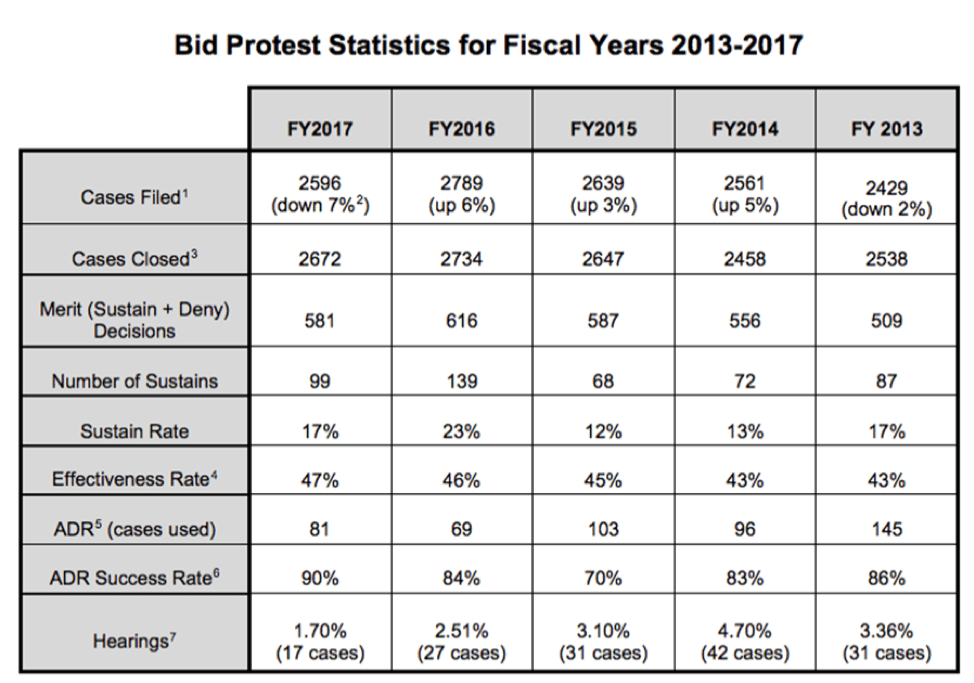 Winning a new government contract or even a major recompete is a big accomplishment. The Contracts Manager shoots out an excited email letting everyone know about the award letter, you schedule the kickoff meeting with the government, schedule an award party…and then you receive notification that someone filed a protest with the General Accounting Office (GAO). If you’re in government contracting long enough, you’ll eventually experience the anger, frustration and even panic, when your award is protested.
Winning a new government contract or even a major recompete is a big accomplishment. The Contracts Manager shoots out an excited email letting everyone know about the award letter, you schedule the kickoff meeting with the government, schedule an award party…and then you receive notification that someone filed a protest with the General Accounting Office (GAO). If you’re in government contracting long enough, you’ll eventually experience the anger, frustration and even panic, when your award is protested.
This is the first of a two-part blog on GAO protests. In this blog, we’ll focus on what to expect when your award is protested and the steps you can take to best protect your company’s interests. For the second part of this blog, we’ll write about when you should consider filing a protest, the protest forums that are available to you and other finer points.
About Bid Protests with the GAO
A bid protest is a challenge to the terms of a solicitation or the award of a federal contract. If you’re an awardee, your award could be protested in any of these three forums: the contracting agency, GAO and the U.S. Court of Federal Claims (COFC). The most frequently used forum for protests is GAO. GAO adjudicates and rules on protests, but they don’t have authority to enforce their rulings. That’s the responsibility of the affected agency’s contracting office. Rarely, though, does a Contracting Officer (KO), ignore or take action that runs contrary to the GAO ruling.
The two basic types of GAO protests are pre-award and award. In a pre-award protest, a company protests the terms, conditions or some other aspect of the solicitation process prior to the proposal submission deadline. An award protest is filed when a bidder disagrees with the award decision. These protest types will be discussed in greater detail in the second blog on this topic.
The 2017 Data for GAO Protests
Each year the GAO releases statistics on the number and outcome of protests filed by contractors. For 2017, protests are down seven percent from 2016. The data also shows that protestors are more often receiving some sort of compensation from the awarding agency. (see Effectiveness Rate on table below as compared to the Number of Sustains, year-over-year.) The lesson: if you win an award and that award is protested, your government customer might feel the heat from the competition to give all, or some of your award away, unless you intervene.
To get a good feel for what has been occurring in the world of GAO protests between 2013 and 2017, please take a look at the table below, Bid Protest Statistics for Fiscal Years 2013 – 2017, from the GAO Bid Protest Annual Report to Congress for Fiscal Year 2017.

The debriefing prepares you for the GAO protest.
To file an award protest with GAO, your competition must request a debriefing from the KO stating why they were not selected for the award. This debriefing must be requested within three days of receiving notice of their unsuccessful bid. Even if you’re an awardee, you should make it standard operating procedure to request a debrief. This serves two purposes: First, it discloses what the proposal evaluation board liked/disliked about your proposal. This is good information to apply to your proposals in the next recompete or if you bid on other contracts for that customer. Second, the debriefs provide you with valuable information in the event a competitor files a protest that you need to respond to. If you’re expecting a protest, you may wish to have your company’s council in attendance so that they can ask questions and anticipate the grounds on which a protest may occur.
If a protest is filed against your award, the protestor might also ask for a stay of contract performance. This should be a consideration in your plans for executing the contract. If it is an award of your recompete, it’s good to have a discussion with the Contracting Officer’s Representative (COR) to see how the agency will handle it to minimize impact. Often, on a protested recompete, the incumbent will continue performing work, but that can vary. If you took the contract from the incumbent, expect them to continue the work while the protest is being decided. But again, even that can vary.
Intervene in a GAO protest as an interested party.
The GAO will immediately notify the agency that owns the contact that a protest has been filed. The agency, in turn, will then notify the awardee(s). If the protest is pre-award, the agency will provide an announcement, perhaps as an amendment, letting potential bidders know of the protest. If the protest has been made post-award, the awardee is an interested party, meaning you have an economic stake in the matter, and as such can file to intervene, in the case. Intervening is the best strategy to protect your interests. Some things to consider:
- You’ll want to lend an ear and a hand to the agency’s council to address any questions they may have and if they are open to it, to help them strategize.
- It may be that the agency just wants to settle by taking the GAO recommended corrective action. As an intervenor, you can influence them to do otherwise, thereby protecting your own interests.
- As an intervenor, your attorney gains access to sensitive, confidential court documents and can argue in your company’s best interest to have your proprietary information redacted before it’s made public.
Winning the bid is just the beginning. Now it’s up to you to keep it. When your competitor’s protest your award, don’t sit by and helplessly await the outcome. By intervening in the protest, you can protect your customer’s and your own best interests.
Further Resources:
https://www.gao.gov/assets/690/688362.pdf
https://www.insidegovernmentcontracts.com/2017/11/gaos-annual-report-protests-effectiveness/
https://www.nextgov.com/cio-briefing/2017/11/bid-protests-decline-2017/142576/
https://www.gao.gov/products/GAO-18-510SP?source=ra
https://www.periscopeholdings.com/blog/protest-bid-contract-award

